
- Index
- Brand
- Power Source
- Terminal Layout
- Type
- 12 V (27)
- Agm Deep Cycle (25)
- Batt (27)
- Battery (523)
- Battery Charger (45)
- Deep Cycle (73)
- Dual Purpose (136)
- Electrical Systems (82)
- Electrics (649)
- Lead Acid Battery (163)
- Leisure Battery (39)
- Lifepo4 Battery (84)
- Numax Leisure (37)
- Powerline Leisure (96)
- Solar Panel (45)
- Split Charge Relay (36)
- Starter Battery (60)
- Supply Battery (27)
- Vrla Agm Battery (74)
- Wet (224)
- ... (4359)
- Voltage (v)
- Warranty
TN Power 60ah 12v Lithium Leisure Battery Heavy Duty Camper VW Van Boat DC9.60
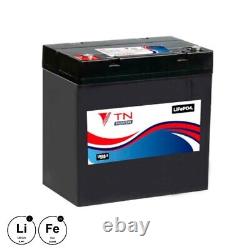
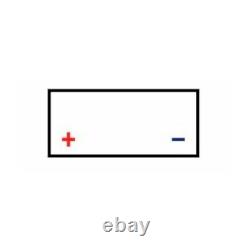
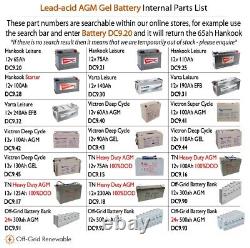
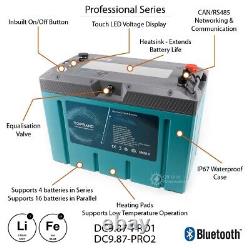
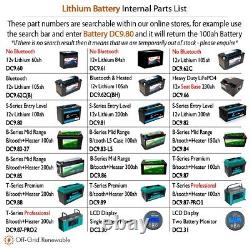
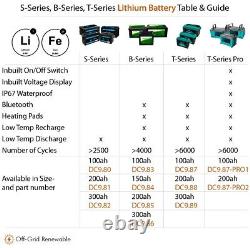
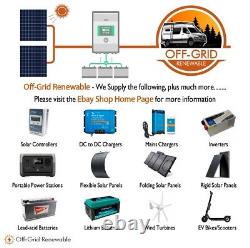


High performance 12v 60ah LiFePO4 Lithium leisure battery with a BMS that supports Series connection and expansion (up to 51.2V) and also supports Parallel expansion up to two batteries. This is a cylinder cell battery - the benefits of cylinder cells are described below. Cylindrical lithium batteries, as the name suggests, feature electrodes that are encased in a cylindrical cell that is wound very tightly within a specially designed metal casing. This unique makeup helps to minimize the chances that the electrode material inside will break-up, even under the heaviest of use conditions, where cylindrical cells are less likely to bloat, leak, or rupture, and are more resilient to moisture, heat and vibration. Cylindrical cells can discharge their energy faster than prismatic cells because they have more connections internally per amp-hour (Ah) and therefore cylindrical cells are used more often in high-performance applications.
Issues like mechanical vibrations, thermal cycling from charging and discharging are all things that can affect a battery's lifespan. Therefore, the design of these cylindrical units is intended to help mitigate risk from these and other factors as much as possible. In a battery pack composed of cylindrical cells, if one cell is damaged, it will not seriously endanger the entire battery pack. The round shape attributes to the mechanic stability of the cylinder cell as it allows for even distribution of electrolytes and internal pressure, greatly reducing the chance of cell deformity and electrolyte leaks. The Cylindrical cell shape leaves gaps when stacked.
This creates space for air to circulate and heat to dissipate allowing the battery to maintain safe parameters and optimal performance in hot temperatures. As you can see from the info above, cell form factor can make a big difference in life expectancy, safety, and budget.
Even more so when you are considering a battery for mobile applications such as a Motorhome, Van or Boat. This TN battery uses LifePo4 Cylindrical Cells because they provide the best thermal and chemical stability. BENEFITS OF LITHIUM OVER TRADITIONAL LEAD-ACID.
This can be charged using most standard lead-acid chargers, MPPT solar chargers and DC to DC chargers. They offer thousands of charge/discharge cycles. Light weight - These are about 40-50% lighter than a comparable lead acid battery. Low temperature charge protection is inbuilt. They provide 100% depth of discharge (DoD).The 100% DOD offers you up to double the useable Ah capacity compared with an equivalent lead-acid battery. Higher charge acceptance rates allow shorter re-charge times.
These will recharge more quickly from a solar panel than a traditional lead-acid battery. Does not contain any liquids. Will not sulphate if left discharged - no risk of damage. No power'tail-off' - voltage remains relatively constant until almost fully discharged. The LiFePO4 batteries are the safest type of Lithium battery as they will not overheat, and even if punctured they will not catch fire. The cathode material in LiFePO4 batteries is not hazardous, and so poses no negative health hazards.PWM solar controllers are NOT suitable for use with these BMS equipped LiFePO4 batteries. Your battery can be charged by 99% of all current Lead Acid battery chargers as the charge is controlled by the batteries internal BMS (Battery Management System), However, we advise to use a charger that has either an'AGM' or'GEL' setting, or preferably use a specific Lithium Battery charger which will use the correct profile and charging voltage. In any fitment where charging is via a dynamo or alternator, it is strongly advised to fit a DCDC charger to control voltage. In systems that use a'Smart Alternator' or where the voltage is above 15v for a 12v system or multiple's thereafter for series banks, a DC-DC charger MUST be fitted to avoid the BMS shutting down to protect the battery. 1x 60ah lithium leisure battery.
Self Discharge =3.5% per month at 25OC. Discharging Cut-off Voltage 10.0V. Charging Voltage 14.014.6V. Charging Mode (CC/CV) - At 0OC45OC temperature, charged to 14.6V at a constant current of 0.2C5A, and then changed continuously with constant voltage of 14.6V until the current was not more than 0.02C5A.Cell & Format IFR32700 N60,4S10P. Please ask for a quote if you are unsure.

